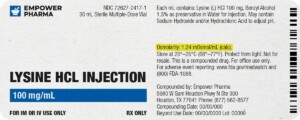Selenium supplements should be used cautiously in patients with GI disease or renal impairment. These conditions may cause high levels of selenium; dosage reductions may be necessary.
In animal models, selenium has been shown to improve glucose metabolism. However, a randomized clinical trial indicates that selenium 200 mcg/day is associated with an increased risk for developing type 2 diabetes mellitus (HR 1.55, 95% CI 1.03—2.33). The results of this trial are derived from a secondary analysis of the Nutritional Prevention of Cancer (NPC) trial designed to determine the effects of selenium supplementation on preventing nonmelanoma skin cancer. In this trial, 1202 patients randomized to selenium (n=600) or placebo (n=602) and followed for an average of 7.7 years self-reported a diagnosis of diabetes mellitus. The patients were primarily non-Hispanic white (98.4%), had a mean age of 63 years, and lived in areas of the US with low rates of selenium consumption. Although the diagnosis of diabetes was confirmed by medical record review in 92% of the patients reporting a positive diagnosis, the results of this trial should be validated using a broader patient population and a more objective mechanism for diagnosing diabetes.[2] Regardless, because of the serious nature of diabetes mellitus, it may be prudent to advise patients with or without diabetes mellitus to use selenium with caution until more information becomes available.
Administration of the recommended dose of selenium injection or use of oral selenium within the recommended dietary daily intakes for a pregnant female is not expected to cause major birth defects, miscarriage, or adverse maternal or fetal outcomes. Animal reproduction studies have not been conducted with selenium injection.[3][4] The use of selenium in excess of the recommended dietary allowance during normal pregnancy should be avoided unless, in the judgment of the physician, potential benefits in a specific, unique case outweigh the significant hazards involved.
Selenium is present in human milk as a natural component. Administration of the recommended dose of selenium injection or use of oral selenium within the recommended daily dietary intake for lactating women is not expected to cause harm to a breastfed infant.[3][4][5] However, there are no data available on the effects of selenium on milk production. If a breastfeeding infant experiences an adverse effect related to a maternally administered drug, healthcare providers are encouraged to report the adverse effect to the FDA.
Some commercial injections of selenium are contraindicated in premature neonates because these products contain benzyl alcohol. Administration of benzyl alcohol to neonates can result in ‘gasping syndrome,’ which is a potentially fatal condition characterized by metabolic acidosis and CNS, respiratory, circulatory, and renal dysfunction. These injections should also not be used in patients with benzyl alcohol hypersensitivity.
Intravenous administration of undiluted selenium into a peripheral vein is contraindicated due to the risk of infusion phlebitis.


 Tralement Injection
Tralement Injection Calcium Gluconate Injection
Calcium Gluconate Injection Zinc Sulfate Injection
Zinc Sulfate Injection Magnesium Chloride Injection
Magnesium Chloride Injection